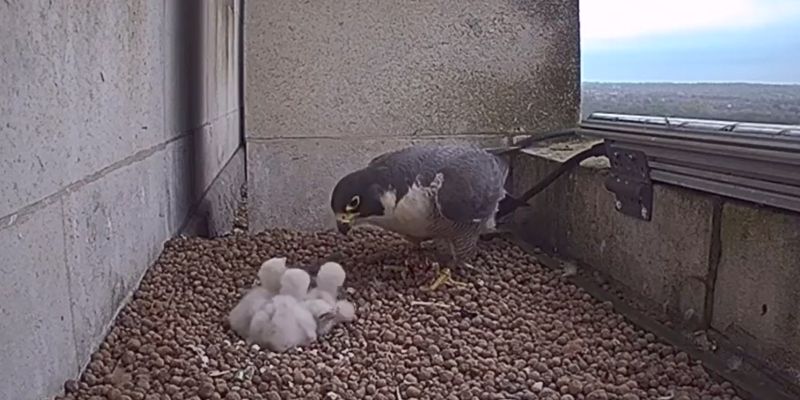
Four tiny peregrine falcon chicks have hatched in the nest on Parkinson Tower this week.
The four chicks are well and have been tucking into tasty morsels of food provided by their attentive parents.
Four eggs were laid in late March, and since then, peregrine watchers have been keeping a beady eye on the live webcam feed from the nest for signs of hatching.
It’s great to see that, thanks to our focus on biodiversity, many species of wildlife choose to call our campus home.
The first egg hatched on Wednesday afternoon, with the other chicks making their way into the world over the next hours.
So many people logged on to the University website to get a glimpse of the new arrivals that the livestream crashed several times. The live footage is now available to watch on YouTube.
Michael Howroyd, the University’s Sustainability Projects Officer and Biodiversity Programme Lead, said: “To have all four peregrine eggs successfully hatching on the Parkinson tower is wonderful and the whole community at Leeds is thrilled with our new arrivals.
“We are really looking forward to seeing them grow over the next few weeks, and hope to provide a home for many more generations of peregrines for years to come. It’s great to see that, thanks to our focus on biodiversity, many species of wildlife choose to call our campus home.”
Peregrines have been nesting intermittently at the University since 2018. In that time 14 chicks have successfully hatched.
This year’s female falcon is identified as ‘7.H’ by the ring on her leg, through which we know that she hatched in Stoke-on-Trent six years ago, whilst the male – known as a tiercel – is unfortunately not ringed.
Supporting wildlife
Falcons are the fastest creatures on the planet, reaching speeds of up to 200mph when diving down to catch their prey. The peregrine is protected under Schedule 1 of the Wildlife and Countryside Act, 1981. However, they still face risks in the wild, with birds illegally killed to stop them preying on game birds and racing pigeons. According to the RSPB, there were 182 confirmed incidents of peregrine persecution across the UK from 2003 to 2022. Between 2018 and 2022 alone, 30 peregrines were killed or injured in England, including 19 which were shot.
The University is a corporate partner of the RSPB and is also a Gold Corporate member of the Yorkshire Wildlife Trust, working in partnership on a range of initiatives. Falcons hatched at the University of Leeds are ringed by a local licenced ringer, which helps track and identify them in future.
Also supporting the monitoring of the peregrines is a small team of people including Leslie Arkless, Analytical Technician in Microstructure Materials Characterisation at The University of Leeds. Les has worked alongside the Yorkshire Wildlife trust for 15 years and has been actively involved in developing our knowledge of the Peregrines to ensure we can work alongside nature to manage our campus.
He said: “The next few weeks are set to be an exciting time for peregrine watchers at Leeds as we see the chicks develop and grow. Peregrines face many threats in the wild, including illegal persecution, and we hope that being able to watch the chicks grow on the webcam will help raise awareness of these protected birds.”
Further information
Picture and video credit: University of Leeds
For more information, please email the University of Leeds press office via pressoffice@leeds.ac.uk.